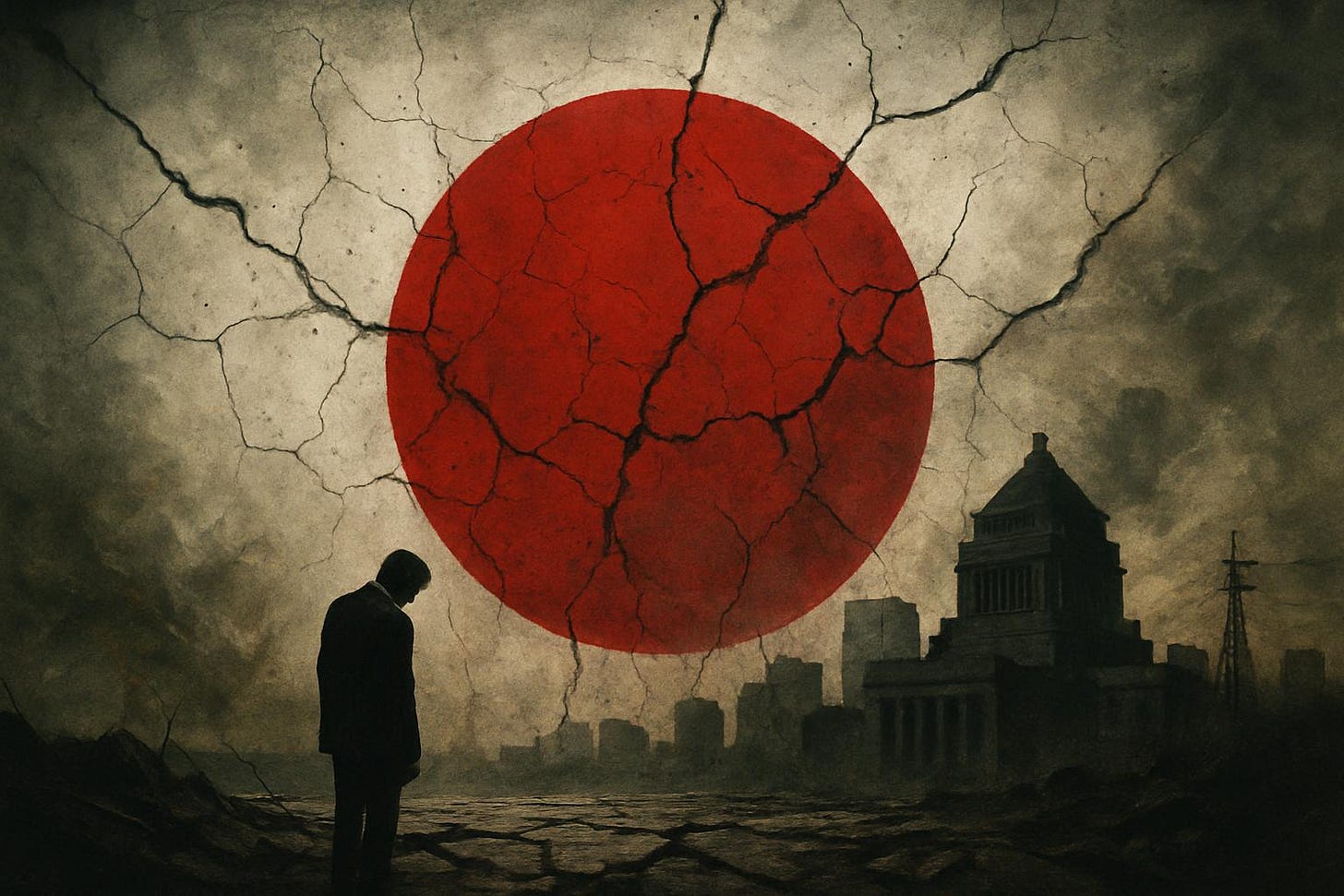The Terminal Crisis of Japanese Politics
by Kazuhiro Hayashida
Kazuhiro Hayashida contends that Prime Minister Shigeru Ishiba’s resignation exposes Japan’s hollow politics and external dependency, warning that only a turn towards multipolarity and the Fourth Political Theory can restore national autonomy and cultural survival.
Shigeru Ishiba has announced his resignation as Prime Minister. This event is more than a simple personnel change; it has exposed the contradictions lying deep within Japanese politics. Ishiba has long been known as pro-China and has been locked in fierce rivalry within the Liberal Democratic Party against the faction of former Prime Minister Shinzo Abe. To protect his own political position, Ishiba prioritized purging the Abe faction, even going so far as to deliberately lead the party into electoral defeat. In Japanese political history, there are very few precedents of a politician placing factional conflict above the overall victory of the party itself.
By contrast, former Prime Minister Fumio Kishida is the archetypal pro-American, whose foreign and security policy has always been tightly coordinated with Washington. Thus, Japanese administrations have been caught in a dual structure — “pro-China Ishiba” versus “pro-America Kishida” — that eroded all consistency in national strategy. This unstable structure has prevented Japan from shaping an autonomous diplomacy and created a recurring “vacuum” ripe for exploitation by external powers.
Today, a widely shared view in Japan holds that China is colluding with the United States to weaken the country. Indeed, when Japan’s posture as an American ally proves inconvenient to China or Russia, one cannot rule out the possibility that the internal political order is deliberately disrupted to undermine Japan’s policy foundations. I myself feel that China’s approach to Japan remains opaque: blending ostensible economic cooperation with an undercurrent of strategic penetration that is difficult to disentangle.
The real problem is that Japanese politicians display an extreme poverty of imagination in the face of such external pressure. They lack long-term strategies rooted in the survival of their culture and history, and remain preoccupied instead with short-term power struggles and ad hoc responses to outside pressure. As a result, Japan has lost cultural autonomy, politics has become hollow at its core, and into that hollow space swarm the forces of international capital: the so-called Deep State. The Deep State gnaws at a still-living Japan, scavenging its economic resources and social institutions.
This image recalls the collapse of the Soviet Union: growing dependence on external powers, systemic corruption, the loss of political imagination, the disillusionment and demoralization of the people. Like the late Soviet system, Japan today is excessively dependent on externally managed economic and security frameworks, and is drifting towards collapse from within. What is even more dangerous is that those who raise their voices against this process are not being organized into genuine agents of autonomy. Instead, they are bought off and instrumentalized — much like Ukrainian nationalism — so that their cries are converted into calls for “military buildup against China and Russia,” which ultimately serves only the scripts of external powers.
This marks the terminal phase of a financial-capitalist state devoid of philosophy. Once, Japan maintained resilient statecraft rooted in cultural uniqueness and social solidarity. Today, the lack of imagination among politicians and the growing reliance on external powers have hollowed out the very foundations of the nation. Only a small remnant of strength remains, and that must be summoned if Japan is to break free from the spell of Westernism. Otherwise, Japan will be completely swallowed by capital and external pressure, and its culture will vanish.
What is needed now is acceptance of multipolarity. Japan must distance itself from unipolar Western-centrism and re-evaluate its place within a Eurasian multipolar order. The Fourth Political Theory provides the philosophical foundation for this shift. It rejects the view of liberalism as the final victor of history and seeks to restore existence itself (Dasein) — rather than man, class, nation, or race — as the center of politics. By recognizing the autonomy of civilizations and designing an order based on mutual recognition and mutual restraint, this perspective offers Japan a path to transcend subordination to the West.
Japanese politics today fatally lacks this philosophical horizon. Ishiba’s resignation, the rivalry between the Abe and Kishida factions — all of it is nothing more than power struggles manipulated by external forces. There is no vision for the nation’s future, no strategy for preserving culture — only the maintenance of intraparty balance and submission to outside dictates. Yet this very emptiness is the essence of Japan’s crisis.
If Japan is to regain its autonomy, it must first confront this emptiness directly. The imagination that politicians lack must be supplied by a philosophical awakening among the people. They must face the end of Western financial capitalism, break free from Anglo-Saxonism, and embrace multipolarity. In this process, Japan should not perceive Russia and China solely as adversaries, but should build new circuits of cooperation as part of Eurasian civilization.
Shigeru Ishiba’s resignation, in this sense, may be the final warning given to Japan. If the country ignores this chance, its culture will disappear and the state will sink into a mere fragment of capital. Yet if the Fourth Political Theory is broadly disseminated and sparks a national awakening, Japan can still rediscover a path towards autonomy.
(Translated from the Japanese)


As a loser from WWII, like Germany, since decades, EVERYTHING happens by foreign design and is implemented by local traitors (the winner's puppets) ...